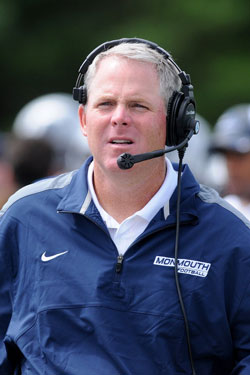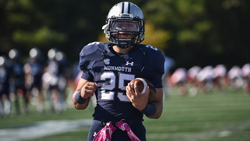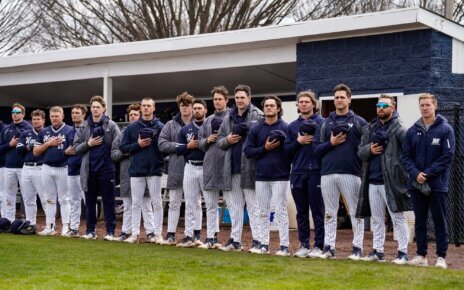The Hawks’ football team, going through somewhat of a re-creation as they enter a new conference, is clicking on all cylinders. Up to this point, the Hawks are 5-2, the first time they have been this successful since 2006 when they were members, and champions, of their recently departed Northeast Conference (NEC).
Through their first six games of the regular season, MU is averaging 39-points-per-game, and racking up 462.3-yards-per-game, as an offensive unit while the defense is holding opponents to 22.7-points-per-game. In their new conference, the Big South, it’s enough to make their newfound opponents take notice of their production. Even though fans have come to expect stellar defensive numbers, it’s the offensive ingenuity that has opened eyes in West Long Branch.
The offensive mastermind of the University, the man in charge of calling the shots and pushing the pace, is Kevin Morris, first-year offensive coordinator and quarterbacks’ coach. Morris, a NJ native by way of Westfield in Union County, arrived at MU this past spring after holding the same position for two seasons at Yale University, an Ivy League program in New Haven, CT.
“It’s the kids. If you get good kids that are willing to work and you get some good players in there that can make plays, and my job is to get them in position to make those plays,” said Morris. “I drew it up on paper, but to execute those plays and to make those throws and those catches in the red-zone in a tough situation on third downs, that’s all players; guys stepping up and making plays when given the opportunity.”
Even though Hawks’ fans are used to offensive stars, such as Dan Sabella, Dave Sinisi, Kyle Frazier, and even the great Miles Austin; never has an offense been so strong in Monmouth’s football program. Kessler Field’s scoreboard has been lighting up since the season debut against Delaware State on Aug. 30 when the Hawks defeated the Hornets en route to a 52-21 victory. This season, the Hawks have scored 50-points or more three times marking a first in the program history. The most recent of these 50 plus games came during MU’s Homecoming with the offensive unit scoring 61-points against Columbia University.
When discussing the Hawks’ offensive production through the season, Morris said, “Our O-Line is doing a great job. Lavon [Chaney] has stepped in since KB’s been out, and even when KB [Asante] was in, Lavon was doing a good job. Missing KB is a huge thing. He’s a senior captain for us; he’s a great football player, a guy who could really carry the load for you. Take him out of the mix and for these guys to keep on rolling at the running back spot, Brandon [Hill] taking the heat off of the running back spot by throwing the ball really well to a high-caliber group of receivers enables us to really keep this pace and scoring touchdowns.”
During the course of his coaching career, more recently as an offensive play-caller, gaudy statistical numbers have surrounded him. As an offensive coordinator at Northeastern University (2000-2003), Morris was instrumental in the little success that the Huskies’ now-defunct football program had experienced. In 2002, Northeastern’s offense averaged 34.5 points-per-game while generating 431.8 yards-per-game en route to the Huskies’ first and only conference championship (Atlantic 10, which is now the present-day Colonial Athletic Association) before bowing out to Fordham in their only playoff appearance. While at the University of Massachusetts, the offensive production continued at roughly 30-points and 400-yards per game, including some deep runs into the FCS playoffs.
“As they say, ‘It’s the jimmies and the joe’s, not the X’s and the O’s,’ so you get some good kids that are willing to be coached and do the work, try to find a way to get better every day. Those are the kids that you want around your program. Those are the kids that are going to make you look good,” Morris said. “Right now, our guys here at Monmouth are making our whole staff and this program look good on offense.”
Coach Morris’s playing career began at Williams College, a member of the New England Small College Athletic Conference (NESCAC), in 1982. Morris said that his time in college instilled a love for the game in him and instructed him on how the game works, with its structure at the collegiate level. Over time, he thought that going into coaching would be something that he could see himself possibly doing.
“I always helped coaching Little Leagues. I had a younger brother that was a few years behind, so I used to help him coach his teams. I was always involved in sports and coaching and it just worked out. The Albany opportunity gave me an opportunity to coach right out of college and try to get my Master’s at the same time,” Morris said.
In 1986, after his playing career ended, Morris got his first college coaching job as a graduate assistant at the University of Albany. It was along that path where he first met who he refers to as a mentor and his future boss Kevin Callahan, MU’s head football coach. The two have been friends for about 25 years.
When asked about Callahan, Morris said “I met him on the road actually down here in New Jersey when he was up at Colgate and I was at Albany and Worcester Polytechnic. I used to recruit New Jersey and he used to help me out down here.”
Although Morris is renowned for his offensive competence, he also spent some time as a defensive assistant. “It definitely gave me good insight in how defenses work, what they’re trying to do, and what they’re trying to accomplish with their particular front and secondary schemes and I think that’s helped me get an understanding of how to attack those defenses,” he said.
Morris made his route to MU when former Hawks’ coach Scott van Zile left to pursue the quarterbacks’ coaching position at Elon University in NC. As Callahan was faced with the duty of filling that void, he made a call to hire his longtime friend, Morris, who was serving the same roles at Yale in CT. When asked about filling the vacancies as the Hawks’ offensive coordinator and quarterbacks’ coach, Morris said he could not pass up an opportunity to work with Callahan and return to his NJ roots.
“I’m a Jersey guy. I love the Jersey Shore. It’s a great opportunity and working with Coach Cal, and this program now going to the Big South with the new facilities coming in and everything else, it’s a very exciting time to be a part of it.”
When most coaches change jobs, they inherit styles and personnel they are not accustomed to working with. Fortunately, Morris already had a steady relationship with MU’s senior quarterback Brandon Hill. Hill originally signed with Morris at UMass before transferring to MU after Morris was fired in 2011.
“He understands how I go about my business because we had a relationship prior when he was in my quarterback meeting room at UMass, so he kind of knows what’s coming, which is really helpful, so it’s not like every time you turn the corner, there’s something new coming down the road. He kind of knows what’s coming around that corner, coming from my perspective. So with that in mind, he can just go out and run the offense and lead the ten guys and I think that’s been a great part of relationship and how it’s affected the team on the field,” Morris said about Hill.
From his time at Northeastern up to now at MU, his various offenses have evolved but it is all personnel-based. He adapts his offensive systems with the players at hand. When asked how his offenses have adapted or evolved over time, he talked about how offensive football has evolved as a whole. “Back in the day, if you ever went to one-back, you were breaking the mold a little bit,” Morris continued. “From all of the two-back offenses, we were definitely that going through my coaching career; a lot of two-backs going to one-back and going to no-backs, so there was always a good mix of it. And then the zone read package started becoming vogue and everyone started having quarterbacks that were a little bit more mobile and could move and read on the run, pull it and run it themselves or pull it and throw it. Those packages are definitely what we’ve done over the years as well.”
Morris talked about using a lot of the no-huddle principles as far back as 1993, when he was the head coach at Worcester Polytechnic Institute, a Division III institution and member of the New England Women’s and Men’s Athletic Conference (NEWMAC). During his time as head coach, he accumulated a record of 24-32 before becoming the offensive coordinator for the Seawolves of Stony Brook University. Morris picked up the intricacies of the up-tempo/no-huddle philosophies from Terry Bowden’s staff at Clemson University in 2000, whose offenses were being coordinated by Brad Scott.
“They really stressed up-tempo stuff. We had done some tempo stuff, but they really had a nice package together that invigorated me to keep some up-tempo in the package,” Morris said.
Morris has also shown some things that many Hawks’ fans haven’t seen before in terms of offensive window-dressing. Fans have seen the offensive unit come to the line of scrimmage with four receivers aligned to one side and we’ve even seen running backs throw touchdown passes. In the Hawks’ homecoming victory over Columbia, Chaney threw two touchdown passes: one to a wide open Hill and another to junior tight end Zach Fabel on a Tim Tebow-like jump pass. Unusual plays such as these are not only fun for the players, but also fun for fans to watch.
“They’re in the playbook. We’ll work on a play for a couple of weeks until it actually gets put into a game, just to get the guys used to running it,” Morris said, when asked about the usage of trick plays and gimmicky formations that have been used in game situations thus far.
With Big South play under way, the focus is to sustain that offensive production.
“Right now, that’s going to be the challenge,” Morris said. “I think that the windows in the pass game are a bit smaller than they might’ve been against some of the previous opponents that we’ve had. The whole competitive edge, in terms of winning the Big South championship, everything is on the line every week and that’s certainly our goal. We’ve really got to be truly focused during practice. All of the coach clichés come out about what you need to do every day, every play; because those things are going to matter in these situations. Every game is going to be tough.”
As much as it could be about Morris and offensive creativity, he really spoke at length about the offensive coaching staff, with several new faces to go along with himself. Not only was Morris one of the key additions to the coaching staff, but he was joined by TJ DiMuzio from Widener University, who replaced Terry Archer as the team’s receivers’ coach. Last season, the football team also welcomed Sam Dorsett from Robert Morris University. Those three key additions to pair with Brian Gabriel and Jeff Gallo have been integral in the offense’s growth and development.
“The offensive staff here at Monmouth has been outstanding. A lot of guys have been here. Coach DiMuzio just came in with me at the same time, but a lot of guys have been here for years. Coach Gabriel, Coach Gallo, and the integration of me into the office and the protocols around and the process is easy, have been fantastic. It’s been a nice mesh and I thank them for that. That’s part of the reason why we’re being successful,” Morris concluded.
PHOTO COURTESY OF Jim Reme




